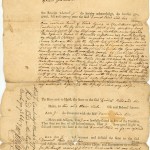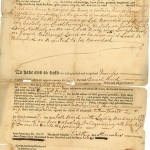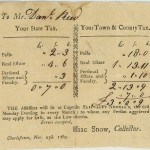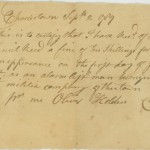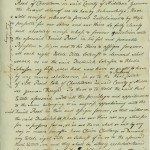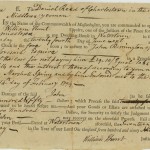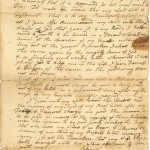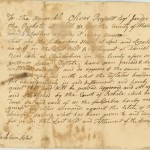[timeline src=”https://docs.google.com/spreadsheets/d/1mpdzAv4zYy-wkFIyXYZde0UjEmM1hZf8Rll_L8dB6Ts/pubhtml” width=”100%” height=”650″ font=”Bevan-PotanoSans” maptype=”toner” lang=”en” ]
Daniel Reed was born on April 10, 1742 to Seth and Lydia Reed. Like his father and grandfather, Daniel was a farmer. Until the mid-19th century, Arlington was a quiet farming community. Colonial Menotomy was characterized by a cluster of buildings surrounding the meetinghouse and burying ground. Along Massachusetts Avenue there were several taverns and beyond that farms were spread out across Menotomy and Charlestown (later part of Arlington).
Daniel married Dorothy Billings of Medford, MA on April 12, 1762. After her death (around 1788), Daniel married Elizabeth Wyman. Daniel had nine children: twins Daniel and Sabra (born 1766), Benjamin, Abigail, triplets Lucretia, Eunice and Roger, Mary (nicknamed Polly) and Susanna. It is unknown whether all his children were with his first wife, or if he continued having children with Elizabeth after Dorothy’s death.
Like his father and most colonial men, Daniel participated in the local militia. He also served in the Revolutionary War.
The British defeated the French in the French and Indian war in 1763 which gave the British government control over a large part of North America. However, the war cost Britain an enormous amount of money and Parliament began passing several laws to tax the colonies.
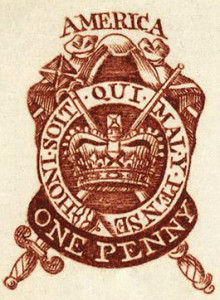
The Stamp Act was passed in 1765 and required the purchase of tax stamps to buy paper. The colonies opposed this act. They thought of themselves as British and were unhappy that they were being taxed without representation. They had no voice in Parliament, a right granted to a Englishmen. The Sugar Act and the Townshend Acts followed with increased tensions between colonists and the British government. After the Coercive Acts were passed in Parliament in 1774, the First Continental Congress began to prepare for independence from England. Increased tensions from both sides ultimately lead to the outbreak of war on April 19, 1775 with “the shot heard ‘round the world.”
There were three companies of militia in Woburn in 1775: Captain Samuel Belknap’s, Jesse Wyman’s and Joshua Walker’s. In 1775, Daniel served as a private in Captain Samuel Belknap’s company.
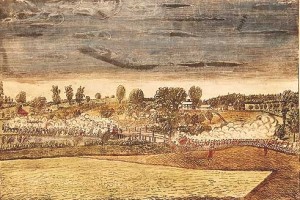
On April 19, the first battles of the Revolutionary War broke out in Lexington and Concord. Daniel marched with Belknap’s company on the alarm from Woburn to Concord and then to Cambridge. Samuel Abbot Smith’s account of that day states that a militia from Woburn met with and fought the British soldiers in Lincoln. “As they passed along the high ground in Lincoln, the men of Woburn came in, one hundred and eighty strong and the fight raged fiercely. The march began to assume the appearance of a flight.” It is not known whether this was Daniel Reed’s company, but we do know that Daniel served in the militia for 29 days, until the formation of the army.
In 1776, Captain William Adams formed a company that marched at the request of General George Washington to assist troops in Dorchester. Known as the Battle of Dorchester Heights, this famous battle of the Revolutionary War ended with the evacuation of the British troops from Boston. Listed as a lieutenant in Captain Adams’s company, Daniel probably participated in the battle in Dorchester. The military promoted Daniel to lieutenant, probably for his early participation in the war. He is also listed as a 2nd lieutenant in Captain Benjamin Locke’s 9th (2nd Cambridge) company.
In 1769, Seth and Lydia deeded thirty acres of land and part of their house to their son Daniel for £100. Several years later in 1779, they deeded an additional eight acres of land to Daniel for £400. Both parcels of land were situated in West Cambridge (now Arlington). Although Daniel was a farmer like his father Seth, he was not as wealthy, owning a fraction of what Seth did in his lifetime. Daniel’s lack of fortune may be due to his active service in the military for most of his adult life.
When his father Seth passed away in 1783, Daniel was appointed executor of the estate. He was in charge of putting Seth’s affairs in order, paying any debts he may have had, and paying for the funeral costs.
In 1786, Daniel and his mother, Lydia, wrote up a contract allowing Daniel to use her farm, buildings and fields. Lydia did not remarry after Seth’s death and instead moved to Lexington to live with family members (presumably one of her children). That left her estate in Cambridge to her son, Daniel. When Lydia passed away in 1790, Daniel was also the executor of her estate.
Aside from his involvement in the Revolutionary War, not much is known about Daniel Reed. The rest of his life seems to be a quiet one and he died in 1801 at the age of fifty-nine. His son, Daniel Reed,would be the first Reed to break away from agriculture.
Below is a gallery of documents from the Fowle-Reed-Wyman collection relating to Daniel Reed:
Next: The Women of the Reed Family
___________________________________________________________
References:


